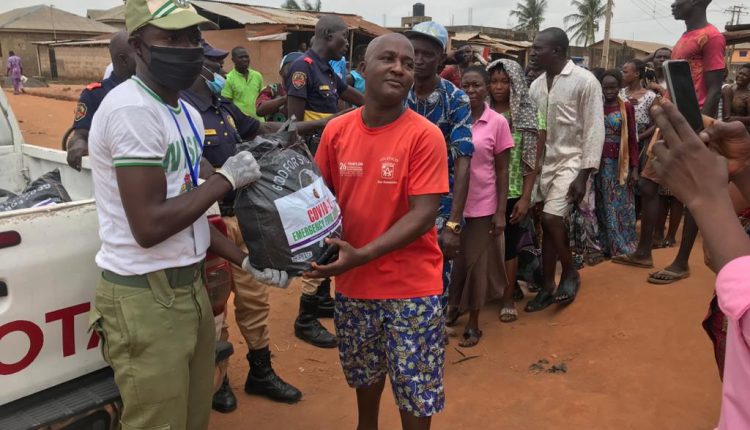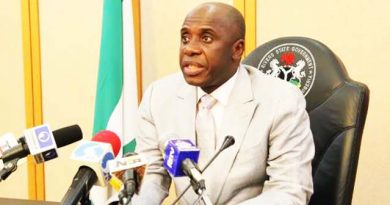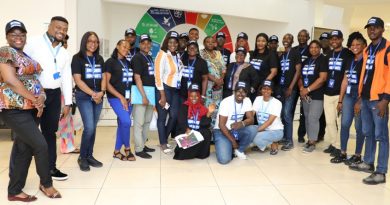COVID-19 Palliatives and the Mysterious Disbursements
Gift Olivia Samuel
Nigeria, just like many other countries around the world was unexpectedly hit by the novel Coronavirus pandemic also known as COVID-19 which took the world by surprise, crippling economies, thereby giving rise to aid from different sources— individuals and corporate bodies alike, as well as foreign and local donors to tackle the pandemic and alleviate the plight of the poor.
The country, which recorded its first case of COVID-19 on February 28, 2020 in Lagos State,currently has over 34,000 confirmed cases, over 19,000 active cases, 14,000 discharged cases and over 700 deaths, according to the Nigeria Centre for Disease Control (NCDC). As the situation progressed, several donations and interventions were rendered to tackle the pandemic but transparency in the disbursement as well as distribution of palliatives is lacking.
It is of note that billions of Naira has been donated to fight COVID-19 Pandemic in Nigeria by both international Communities, development partners, and even individuals in the form of grants, loans, and personal contribution to the Nigerian government to fight the pandemic. As at April 24, 2020, interventions had hit N87.028 billion, a breakdown of which shows that 1.2% was government donation, 11.23% from organizations, international donations stood at 50.3% while individual donations was put at 38.3%, according to data from Follow The Money(FTM) Nigeria.
However, lack of adequate information, poor coordination, lack of transparency and clear accountability measures for spending has trailed the disbursement of the funds as well as distribution of palliatives and relief materials to communities. Only few beneficiaries have been sparely recorded in comparison to the population that are in dire need of such interventions.
It is a known fact that prominent private-sector leaders, under the auspices of the Coalition Against COVID-19 (CACOVID) have donated N27.160 billion as of May 8, 2020. Also the Central Bank of Nigeria announced a N1 trillion stimulus package, and then the Federal Government asked the National Assembly to approve a N500 billion intervention fund; it also withdrew $150 million from the Sovereign National Fund and borrowed $6.9 billion from the International Monetary Fund (IMF), all in a bid to cushion the effect of Coronavirus. Aside that, the 43 Cabinet ministers pledged 50% of their March, 2020 salary to support the federal government’s effort to combat the COVID 19 pandemic in the country, but the breakdown of the contributions has not been made public by the Ministry of Finance and disbursement of these funds has somewhat been shrouded in secrecy.
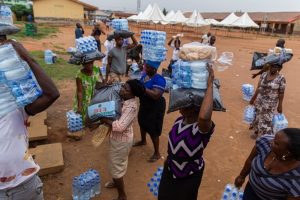
On its part, the Nigerian National Petroleum Corporation (NNPC), with 33 partners drawn from the upstream sector and the companies drawn from the oil producers trade section and the Independent Petroleum Producers Group(IPPG), donated 30 million dollars to support the federal government’s efforts at curbing the spread of Coronavirus.
According to the NNPC Group Managing Director, Mele Kyari, the donation was aimed at supporting the national healthcare delivery facilities and covers three key thematic areas which includes— provision of medical consumables, deployment of logistic and in-patient support, and delivery of medical infrastructure. “The three thematic support initiatives amount to a total of 30 million dollars and will be delivered in phases starting from March 27”, he said.
Also, the Director-General of the Nigeria Centre for Disease Control, Dr. Chikwe Ihekweazu on June 16, 2020, said that out of about N6.5 billion released to the agency, about N1.3 billion had so far been spent, while about N898 million had been committed to specific projects with the balance still in the account of the agency, but there is no breakdown of how the money was spent and what the balance will be used for.
Furthermore, the United States Government, through the U.S. Agency for International Development (USAID) and Department of State, announced on April 17 that new funding for Nigeria for the prevention and mitigation of the novel coronavirus (COVID-19) has reached $21.4 million.
The U.S. Ambassador, Mary Beth Leonard, stated that approximately four fifths of the assistance – nearly $18 million – will go towards humanitarian assistance and includes for risk communication, water and sanitation activities, infection prevention, and coordination, and humanitarian assistance for refugees, internally displaced persons (IDPs), and their host communities. She also said that the funding was to support critical activities to control the spread of this disease, such as rapid public-health information campaigns, water and sanitation, and preventing and controlling infections in health-care facilities.
The Federal government through the Federal Ministry of Humanitarian Affairs, Disaster Management and Social Development headed by Sadiya Umar Farouk, distributed palliatives to some unknown Nigerians which she noted was supposedly given in the forms of cash payments, cash transfers, food distribution and other reliefs during the lockdown in Abuja, Lagos and Ogun states but the names of these mysterious beneficiaries were however not made public and the source used to generate the data still questionable.
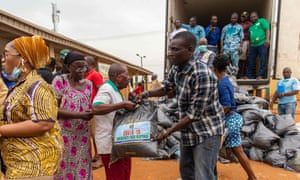
Mrs Farouk, had told Nigerians that the social intervention programme would generate its data from sources namely, use of their social register, use of bank balances of less than N5,000 (monthly), using bank verification number (BVN) data and finally use of data on persons who recharge their mobile phones with values of less than N100, however, monies were shared by hand to most of the beneficiaries, while millions of the country’s poorest and most vulnerable people have not benefited from the announced palliatives, donations, reported cash payments, cash transfers and other reliefs and the details of the few who benefited are still unavailable.
Meanwhile, of the over 90 million poor Nigerians, only about 2.6 million are captured in the social register but disbursement still remains patchy. In light of the COVID-19 outbreak, Connected Development’s (CODE) social accountability platform, Follow The Money (FTM) launched its accountability campaign on COVID-19 donations, tagged #FollowCOVID19Money—a campaign to study the utilization of emergency funds and donations, so as to demand transparency and accountability in the disbursement of the COVID-19 funds and donations.
The platform www.ifollowthemoney.org with over 5300 members and its well structured community mobilization strategy is being used to advocate strongly for improved healthcare facilities for all as the nation combats COVID-19. According to CODE’s Chief Executive, Hamzat Lawal, the campaign will provide citizens with online tools to monitor and drive conversation to spark actions and advocate for a transparent and inclusive approach, urging government stakeholders to make public all funds released for the fight against COVID-19 and its implementation plans.
With a network of volunteers of data journalists, researchers, storytellers and activists, FTM movement in Nigeria, Kenya, The Gambia, Zimbabwe, Cameroon, Malawi and Liberia
tracks, monitors, investigates, reports and exposes discrepancies in the management of donor funds to state institutions responsible for prosecution. In addition, FTM is conducting verification and monitoring of actual disbursements – cash and in-kind transfers to poor and vulnerable populations.
CODE, using the #FollowCOVID19Money is calling on all citizens to track all public and private donations made to combat COVID-19 in their Communities, as well as follow up with judicious spending and execution of COVID-19 funds in their states.
There is the need for the Central Bank of Nigeria, Ministry of Finance, Private Sector Coalition, the NCDC, the Presidential Task Force on COVID-19, Ministry of Health and even the Ministry of Humanitarian Affairs, state governments and other relevant agencies to be transparent and accountable by ensuring that a comprehensive list of beneficiaries of COVID-19 disbursement, and spending details of public funds and private sector donations received so far is published.
Nigerians deserve to know how much has so far been donated for COVID-19, names of those who have made payments in line with their publicly announced donations,spending details of the COVID-19 intervention fund and the names of beneficiaries of palliatives. Doing this will rebuild trust in institutions and show transparency on the part of the government.
Citizens need to have access to information for democracy to thrive, as accountability and transparency is key to winning the heart of the people.
Nigerians deserve better!

